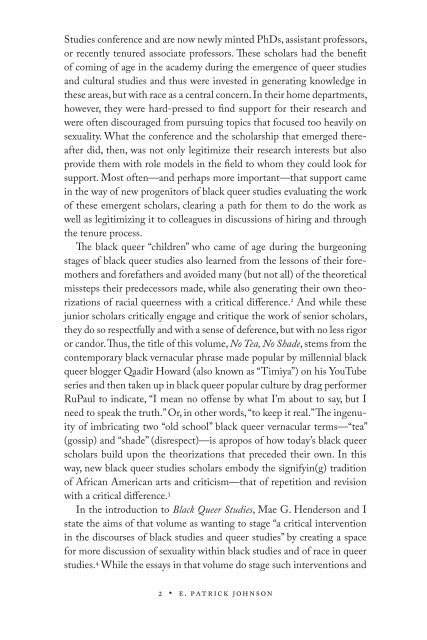No Tea
89AS6wvrf
89AS6wvrf
Create successful ePaper yourself
Turn your PDF publications into a flip-book with our unique Google optimized e-Paper software.
Studies conference and are now newly minted PhDs, assistant professors,<br />
or recently tenured associate professors. These scholars had the benefit<br />
of coming of age in the acad emy during the emergence of queer studies<br />
and cultural studies and thus were invested in generating knowledge in<br />
these areas, but with race as a central concern. In their home departments,<br />
however, they were hard-pressed to find support for their research and<br />
were often discouraged from pursuing topics that focused too heavi ly on<br />
sexuality. What the conference and the scholarship that emerged thereafter<br />
did, then, was not only legitimize their research interests but also<br />
provide them with role models in the field to whom they could look for<br />
support. Most often— and perhaps more impor tant— that support came<br />
in the way of new progenitors of black queer studies evaluating the work<br />
of these emergent scholars, clearing a path for them to do the work as<br />
well as legitimizing it to colleagues in discussions of hiring and through<br />
the tenure pro cess.<br />
The black queer “ children” who came of age during the burgeoning<br />
stages of black queer studies also learned from the lessons of their foremothers<br />
and forefathers and avoided many (but not all) of the theoretical<br />
missteps their pre de ces sors made, while also generating their own theorizations<br />
of racial queerness with a critical difference. 2 And while these<br />
ju nior scholars critically engage and critique the work of se nior scholars,<br />
they do so respectfully and with a sense of deference, but with no less rigor<br />
or candor. Thus, the title of this volume, <strong>No</strong> <strong>Tea</strong>, <strong>No</strong> Shade, stems from the<br />
con temporary black vernacular phrase made popu lar by millennial black<br />
queer blogger Qaadir Howard (also known as “Timiya”) on his YouTube<br />
series and then taken up in black queer popu lar culture by drag performer<br />
RuPaul to indicate, “I mean no offense by what I’m about to say, but I<br />
need to speak the truth.” Or, in other words, “to keep it real.” The ingenuity<br />
of imbricating two “old school” black queer vernacular terms— “tea”<br />
(gossip) and “shade” (disrespect)—is apropos of how today’s black queer<br />
scholars build upon the theorizations that preceded their own. In this<br />
way, new black queer studies scholars embody the signifyin(g) tradition<br />
of African American arts and criticism— that of repetition and revision<br />
with a critical difference. 3<br />
In the introduction to Black Queer Studies, Mae G. Henderson and I<br />
state the aims of that volume as wanting to stage “a critical intervention<br />
in the discourses of black studies and queer studies” by creating a space<br />
for more discussion of sexuality within black studies and of race in queer<br />
studies. 4 While the essays in that volume do stage such interventions and<br />
2 • E. Patrick Johnson


